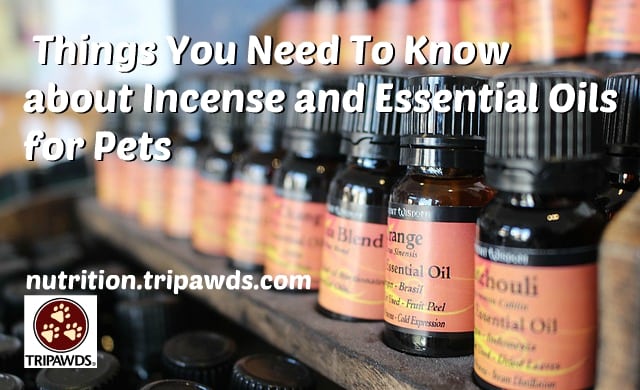The pleasant aromas of essential oils for pets and people have many upsides, like better smelling homes and chemical-free health remedies. But did you know these products have risks too? Here’s what we all need to know about incense and essential oils for pets.
Natural Scents Aren’t Quite What they Seem
Chemical-free incense and essential oils are sold everywhere these days and most of us love using them. We can ditch toxic products for alluring scents and oils that freshen the air in our homes, clean our kitchens and heal the body. But, did you know that even these “natural” products can be dangerous for our pets?
Essential Oils Can Hurt Our Pets
The ASPCA Animal Poison Control Center (APCC) wants all pet parents to know that:
In their concentrated form (100%), essential oils can absolutely be a danger for pets. Dogs and cats who have either walked through oils, gotten some on their coat or had oils placed directly on them can develop health concerns.
Cats and essential oils are an especially dangerous concentration. One impacted by a toxin like full-strength essential oil or a spilled potpourri container, a cat’s liver may have a hard time metabolizing and flushing out toxins. The Pet Poison Control Center’s “Essential Oils and Cats” article is a must-read for feline pet parents.
Breathing Incense Smoke is Like Smoking Cigarettes
Many hippies-at-heart love using incense, but in a 2008 study of the air surrounding religious temples in Asian countries (“Incense smoke: clinical, structural and molecular effects on airway disease“) clinicians discovered that:
When incense smoke pollutants are inhaled, they cause respiratory system dysfunction. Incense smoke is a risk factor for elevated cord blood IgE levels and has been indicated to cause allergic contact dermatitis. Incense smoke also has been associated with neoplasm . . .
And in a more recent study, scientists found incense and cigarette smoke have similar risks!
So much for the natural air cleaners. What’s a pet parent to do?
Tips When Using Essential Oils for Pets
Most of us can live without smoky incense for the health of our pets and ourselves, but do we need to ditch essential oils too? We don’t think so. Essential oils can be safe when used properly, so keep these things in mind when considering the ones you want to use around your home or on your pets.
Your local essential oil sales rep is not the expert you want to turn to, unless they have a DVM after their name. As always, a holistic-minded veterinarian with essential oils knowledge is the best person to keep your pets safe.
Use care when researching essential oils online. We were shocked to discover that out of the many YouTube videos about pets and essential oils, and among the dozens of books covering the topic on Amazon, only one was actually written by a veterinarian!
There is one vet with a longstanding reputation as an essential oils expert: The Oily Vet, Melissa Shelton DVM. We covered her book “Essential Oils for Natural Pet Care” a while back, and just this year she released a more comprehensive guide, The Animal Desk Reference II: Essential Oils for Animals. She also has an all-new product line of essential oils for pets called AnimalEo that you may want to check out.
We haven’t read Dr. Shelton’s book ourselves so if you do, please let us know what you think.
Practice care when using diffusers. Animal noses are way more powerful than ours. If you think something smells good, that scent may actually be making your animal feel nauseated. Don’t go overboard on diffuser air fresheners around pets, and if your dog or cat has any kind of breathing issues, consider ditching diffusers altogether.
Finally, always keep your essential oils and any related products far from the reach of curious dogs and cats.
According to the VCA Pet Hospitals website, Signs of Essential Oil Poisoning in Pets includes:
Fragrance or scent on hair coat, skin, or breath or in vomit
Difficulty breathing
Difficulty walking or uncoordinated gait
Drooling
Lethargy or weakness
Muscle tremors
Pawing at the mouth or face
Redness or burns on the lips, gums, tongue, or skin
Vomiting
If any get knocked over or you suspect your pet ingested some oil or other natural scented product, call the Pet Poison Helpline and your vet for immediate help.


I have a dog with a fatty tumor and I heard that frankincense therapeutic essential oil is good for that. I was thinking of order it but I do not know how to properly use it on a large dog. Can you tell me how it helps animals with cancer or fatty tumors and how to dilute and how much to use?
Thank you!
You would need to contact a veterinary essential oil expert with that question, like Dr. Shelton who we mention above, or download her book.